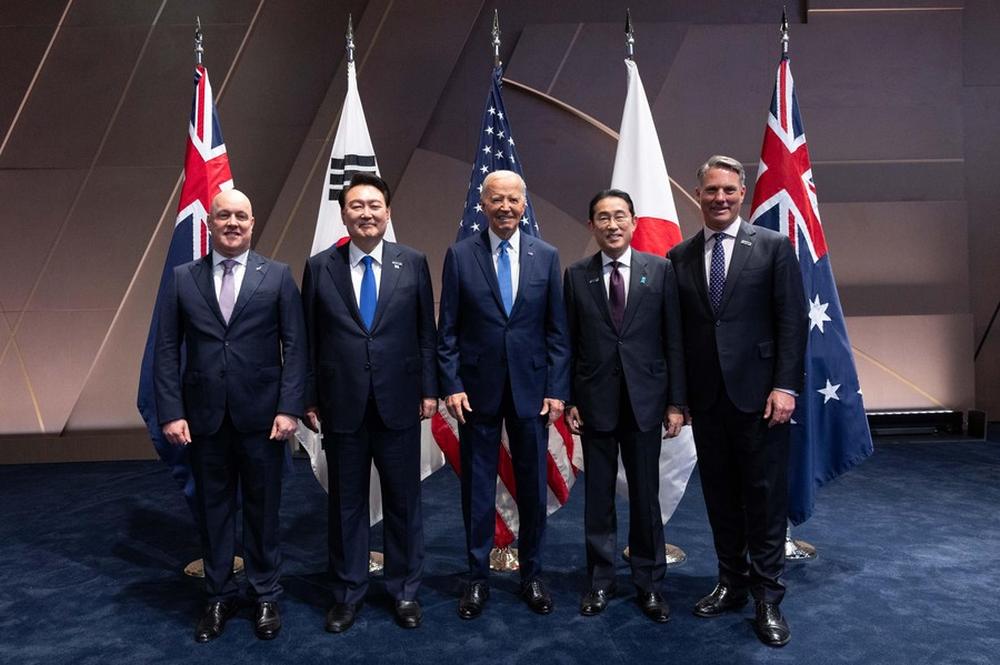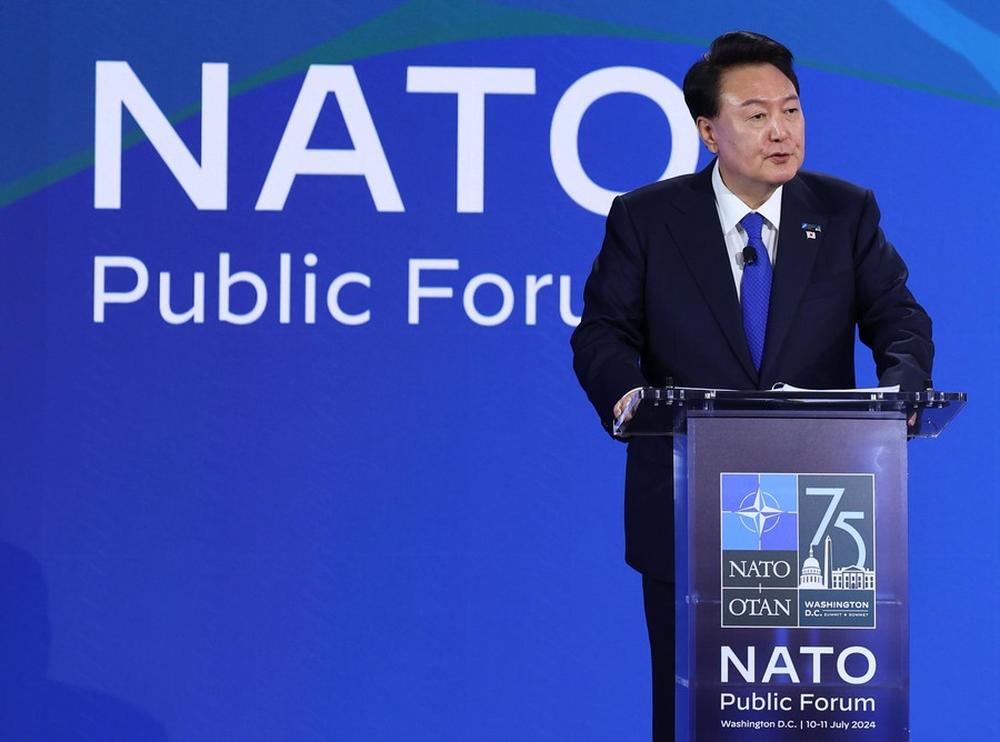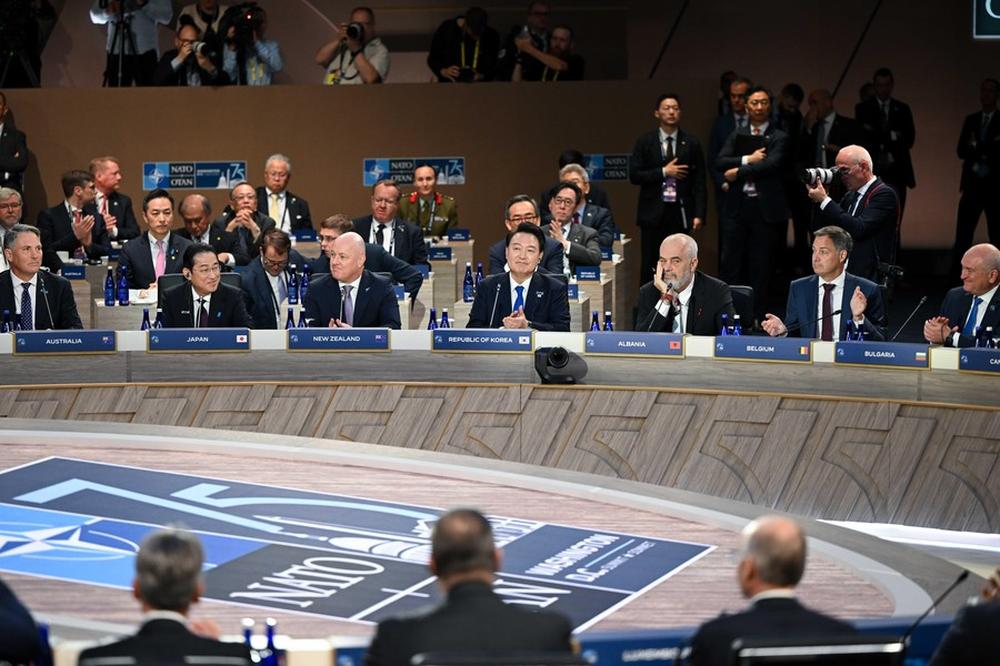- #Japan
- #Multilateral Relations
- #Security & Defense
- #US Foreign Policy

► No one country in today’s world can achieve its national security all by itself. International partnership is critical.
► American commitment to international security will continue to be indispensable as the U.S. will remain at the pinnacle of the world power hierarchy.
► NATO’s effort to enhance partnership with the four countries known as “IP4”, i.e., Australia, Japan, New Zealand and the Republic of Korea, corresponds to these views.
► Korea and Japan must go forward to bolster the rules-based international order built upon the principle of the rule of law in accordance with the Spirit of Camp David together with the U.S., and also with other partners including NATO.
Importance of alliances and partnerships for international security in today’s world
The Russia-Ukraine war teaches an important lesson to the international community: No one country in today’s world can achieve its national security all by itself. International partnership is critical. Both Korea and Japan must keep it fully in mind as the only two allies of the U.S. in Northeast Asia, the security environment of which is more acute than ever due to the actions of the three nuclear and authoritarian countries and the recent development of their partnership.
Three weeks before the Russian invasion of Ukraine, the leaders of Russia and China met with each other and issued a joint statement, in which they denounced western alliances and partnerships as “exclusive blocs and alliances of convenience.” On the one-year anniversary of the Russian invasion of Ukraine, China released its position on the political settlement of the Ukraine crisis, in which China stated, “The security of a country should not be pursued at the expense of others. The security of a region should not be achieved by strengthening or expanding military blocs.” These assertions should not be regarded as a right view on the collective efforts of the Euro-Atlantic and Indo-Pacific regional countries to try to recover and strengthen the rules-based international order.
Importance of the U.S. engagement in international security
Today’s world is full of security risks, both traditional and non-traditional. Unfortunately for all the U.S. allies in the Euro-Atlantic and Indo-Pacific regions, the U.S. itself is viewed as a risk now that U.S. allies are concerned about the specter of a second Trump presidency.
From this perspective, it could be easy to find their efforts to make the alliances Trump-proof before the U.S. presidential election in November, such as their commitment to a more robust partnership, recognition of the necessity to invest more in common defense, strengthening interoperability, and more advanced institutionalization of security cooperation, in some of the key documents related to alliance cooperation including the United States-Japan Joint Leaders’ Statement of April 10, 2024 and Biden-Yoon Joint Statement on U.S.-ROK Guidelines for Nuclear Deterrence and Nuclear Operations on the Korean Peninsula of July 11, 2024. NATO’s Washington Summit Declaration of July 10, 2024 could be also viewed as one of such efforts.
However, future of the North Atlantic Alliance, the Korea-U.S. Alliance and the Japan-U.S. Alliance should be viewed from a broader perspective. It should not be overshadowed by Donald Trump.
American commitment to international security will continue to be indispensable as the U.S. will remain at the pinnacle of the world power hierarchy. Even if the former president is reelected in November, he is not what the U.S. is all about. In fact, the U.S. is much more than Trump no matter how strong his domestic support base is. The U.S. Government is much more than the executive branch although a larger portion of the U.S. diplomatic power is vested in the executive branch.
U.S. allies including Korea and Japan must make every effort individually and in concert to keep the U.S. engaged in Northeast Asia and the entire Indo-Pacific by strengthening their respective alliance cooperation with the U.S. Here is another reason Korea and Japan must cooperate with each other.
First, they must understand the diversity of the American society and promote public diplomacy to increase the U.S. public awareness of the importance of engagement with their Asian allies.
Second, as alliance is mutual cooperation, allies must lead the alliances until the U.S. takes its leadership role again. Well-coordinated effort of Korea and Japan as the two nations hosting the U.S. military presence in Northeast Asia is critically important.
Third, when Korea and Japan cooperate to keep the U.S. engaged in international security, it is important for them to strengthen their ties not only with each other and with like-minded countries in the Indo-Pacific region but also with extra-regional partners as the world is more interconnected than ever. This approach is consonant with the global nature of the Korea-U.S. Alliance and the Japan-U.S. Alliance.
Importance of partnership with NATO
Partnership with NATO is particularly important and timely in this context.
NATO Secretary General Jens Stoltenberg said during his visit to Seoul in January 2023 that what happens in Europe matters to the Indo-Pacific and that what happens in Asia matters to NATO. Two days later, he said in Tokyo that we may be oceans apart but our security is closely connected, and that Putin’s war of aggression against Ukraine is not just a European crisis but a challenge to global security and stability. Japan’s Prime Minister Fumio Kishida often says that Ukraine of today may be East Asia of tomorrow. NATO’s effort to enhance partnership with the four countries known as “IP4”, i.e., Australia, Japan, New Zealand and the Republic of Korea, corresponds to these views. In fact, NATO’s Washington Summit Declaration says, “The Indo-Pacific is important for NATO, given that developments in that region directly affect Euro-Atlantic security.” Based on this recognition, NATO is enhancing its practical cooperation with IP4 countries in the areas of supporting Ukraine, cyber defense, countering disinformation, and technology, in order to enhance NATO’s ability to work together in shared security interests.
IP4 countries, particularly Korea and Japan, must capitalize on this newly generated momentum for partnership with NATO in light of the following factors: First, Northeast Asia and Western Europe geographically sandwich Russia; Second, Korea and Japan neighbor on Russia, North Korea and China, and these three countries are forming a bloc challenging the rules-based international order; and third, NATO is heightening its concern on North Korea and China.
NATO’s concern on China expressed in the Washington Summit Declaration is often highlighted, but NATO’s growing threat perception on North Korea should be also underlined. The Washington Summit Declaration not only condemns North Korea’s direct military support to Russia but also expresses great concern over the deepening ties between North Korea and Russia.
In fact, North Korean threat is not regional any longer. It is global as North Korea is almost ICBM-capable and as it is helping Russia’s war of aggression on Ukraine. Also, Russia set a bad example for North Korea. North Korea’s denuclearization has become more difficult as Russia acted against the security assurance it gave to Ukraine in exchange for Ukraine’s abandonment of nuclear weapons. By dismissing the security commitment articulated in the Budapest Memorandum of 1994, Russia provided North Korea a convenient excuse to retain nuclear weapons. Therefore, the international community must have Ukraine win the war so that the NPT regime is protected.
Joseph Wu, Secretary General of Taiwan’s National Security Council, wrote when he was Foreign Minister that by helping Ukraine, democracies can increase their relative strength against the Chinese-Russian coalition in his Foreign Affairs article titled “Defending Taiwan by Defending Ukraine.” He is right, and likewise democracies can defend against North Korea by defending Ukraine.
Korea and Japan must go forward to bolster the rules-based international order built upon the principle of the rule of law in accordance with the Spirit of Camp David together with the U.S., and also with other partners including NATO.
Professor Hideshi TOKUCHI served as the nation’s first-ever Vice-Minister of Defense for International Affairs from 2014 to 2015 after completing several senior assignments in the Ministry of Defense, including the Director-General of Defense Policy Bureau, of Budget and Equipment Bureau, of Personnel and Education Bureau, and of Operations Bureau. He has been the President of the Research Institute for Peace and Security (RIPS), an independent think-tank in Tokyo, since 2021. He is also teaching security-related issues at a number of universities in Japan, including Sophia University and Hitotsubashi University. He earned his Bachelor of Laws degree from the University of Tokyo in 1979, and his Master of Arts in Law and Diplomacy (M.A.L.D.) degree from the Fletcher School of Law and Diplomacy in 1986.

